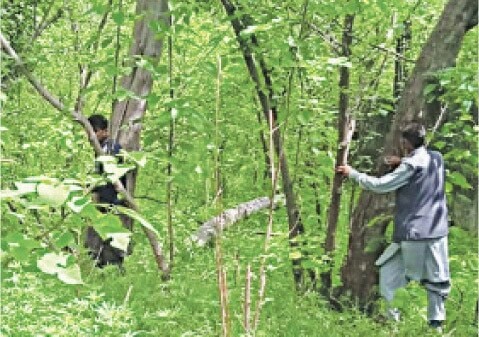
The Capital Development Authority (CDA) has decided to remove all wild mulberry trees from Pakistan’s capital, Islamabad, as part of an environmental initiative. The campaign aims to replace paper mulberries with thousands of native plants, improving air quality and reducing health hazards associated with pollen allergies.
This decision was made during a meeting held at the CDA headquarters, chaired by CDA Chairman Muhammad Ali Randhawa. The session was attended by environmental expert Rizwan Mehboob, specialists from the Baku team, and senior officials from the CDA’s Environment Wing.
During the briefing, experts highlighted the significant impact of wild mulberry trees on public health, particularly in spring when a large portion of the population suffers from pollen allergies. Recognizing this concern, Chairman Randhawa directed the removal of more than 10,000 mulberry trees in the Shakarparian area and instructed authorities to plant thousands of native trees in their place.
Pollen, a fine powder produced by trees, plants, and grasses, plays a vital role in the reproductive process of wild mulberries. However, Islamabad has an overwhelming number of paper mulberry trees, which have long been a source of distress for its residents. Every year, as spring approaches, the city’s inhabitants experience severe allergic reactions due to the high concentration of airborne pollen.
These pollen particles are known to cause intense respiratory allergies and related illnesses, making life difficult for many. To address this issue, the CDA has now decided to replace paper mulberries with three environmentally friendly plant species.
This initiative is expected to significantly improve Islamabad’s environment, providing much-needed relief to residents who suffer from pollen-induced respiratory issues, particularly during the peak allergy season in February and March.
Pollen Count in Islamabad
As dawn breaks over Islamabad, a thin, almost imperceptible haze settles in the air. Though invisible to the naked eye, it carries a potent force, bringing discomfort to thousands. The dreaded pollen season has arrived in full swing, and the latest data paints a troubling picture—particularly for those suffering from asthma and respiratory conditions.
Over the past 24 hours, the Pakistan Meteorological Department (PMD) has recorded alarmingly high pollen levels across the capital. The hardest-hit sector, H-8, registered a staggering 10,494 particles per cubic meter, with similarly high concentrations in E-8 (5,173), G-6 (5,638), and F-10 (2,989). At the heart of the crisis is paper mulberry, responsible for a staggering 94% of the total pollen load, reaching an astonishing 10,226 particles per cubic meter in H-8 alone.
Dr. Ayesha Kamal, a pulmonologist at PIMS Hospital, warns that these levels are not just a seasonal nuisance but a serious health hazard. “For individuals with pollen allergies, the current count can trigger severe reactions, ranging from relentless sneezing and itchy eyes to full-blown asthma attacks. Even those with mild sensitivities should exercise caution,” she advises.
While paper mulberry remains the primary culprit, other pollen sources—including grasses, cannabis, and pine trees—are also present at high levels, exacerbating respiratory distress. In contrast, Eucalyptus and Alternaria remain at low levels, while Dandelion and Acacia are entirely absent from the count. However, this provides little comfort to those struggling with pollen-induced ailments.
In response, the PMD has deployed monitoring stations in key sectors—H-8, E-8, G-6, and F-10—to provide real-time updates on airborne pollen levels. “We urge residents to stay informed and take necessary precautions,” says a PMD spokesperson. “Limit outdoor activities, keep windows closed, and wear masks when stepping outside.”
For individuals with severe allergies, the coming weeks will be particularly challenging. Experts predict that pollen concentrations will continue to rise until mid-March, peaking at levels that could lead to an increase in hospital visits. With no immediate solution in sight, vigilance and preventive care remain the best defense.
 BeNewz
BeNewz




